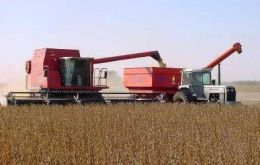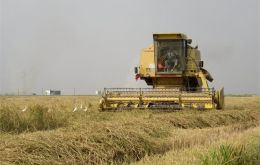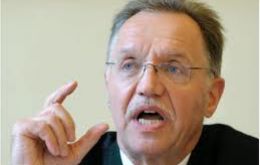MercoPress. South Atlantic News Agency
Agriculture
-
Tuesday, May 10th 2011 - 22:45 UTC
Good soybean crop prospects in Brazil and Argentina, could total 123 million tons

Soybean crop prospects in Brazil and Argentina, the second- and third-biggest exporters of the oilseed behind the U.S., have improved, researcher Oil World said in a report Tuesday. Growers in Brazil will produce 73 million metric tons of soybeans, up from a record 68.7 million tons a year ago, and farmers in Argentina will harvest 49.5 million tons, up 1% from a prior estimate.
-
Tuesday, May 10th 2011 - 09:55 UTC
Brazil considering leasing farm land to foreigners to circumvent sales restrictions

Brazil may start leasing farm land to foreigners to find a way around new legal restrictions on land sales and attract more foreign investment, the agriculture minister said.
-
Saturday, May 7th 2011 - 04:50 UTC
Soybean and by products represent 25% of Argentine exports

Argentine overseas sales of soybeans and by products reached 17.3 billion US dollars in 2010, equivalent to 25.4% of total exports, according to the latest report from the country’s statistics office INDEC. In 2009 the soy complex exports represented 23.3%.
-
Friday, May 6th 2011 - 17:28 UTC
EU farmers insist with the “catastrophic impact” of trade agreement with Mercosur

European farm leaders have left Members of the European Parliament in no doubt about the ‘catastrophic impact’ on EU agriculture of a trade agreement with Mercosur, reports the Friday edition of the UK’s Farmers Guardian.
-
Friday, May 6th 2011 - 17:24 UTC
Top US grain processors join the ‘bio-fuel refineries rush’ in Brazil
Cargill Inc and the world’s largest grain processor Archer-Daniels-Midland Co, are planning to invest about 560 million US dollars in new bio-fuel refineries in Brazil.
-
Friday, May 6th 2011 - 17:21 UTC
US payrolls expanded in April, but jobless rate climbed to 9%
United States employers in April added more jobs than forecast. Payrolls expanded by 244,000 last month, the biggest gain since May 2010, after a revised 221,000 increase the prior month, the Labour Department said Friday in Washington.
-
Friday, May 6th 2011 - 01:42 UTC
Boosted by bio-fuels Brazil increases soy bean and oil processing-refining capacity

Brazil’s soy bean processing volume increased 7% in 2010 over 2009 while at the same time reducing idle capacity given the larger crop and a jump in the production of bio fuels, according to a release from Abiove, (Brazilian association of vegetable oil industries).
-
Tuesday, May 3rd 2011 - 05:20 UTC
FAO estimates 2011 rice world production up 3%; Latam to rebound 9.2%

Rice production is expected to rise to 480 million tons in 2011, which is 3% higher than a year earlier, due to improved weather conditions, the United Nations Food and Agriculture Organisation said on Monday.
-
Tuesday, May 3rd 2011 - 00:41 UTC
EU/Mercosur trade negotiations resume in Paraguay

Bilateral negotiations for a trade agreement between Mercosur and European Union delegates are scheduled to resume Tuesday in Asunción, Paraguay.
-
Tuesday, May 3rd 2011 - 00:32 UTC
Farmers warn European Parliament of ‘catastrophic impact’ of trade accord with Mercosur

European farmers insisted Monday before the European Parliament on the “catastrophic impact” that a trade agreement with Mercosur could have for the EU agriculture.